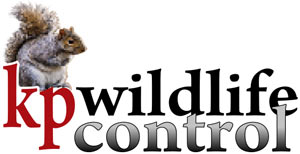Wildlife intrusions can cause significant damage to your property and pose health risks to your family. Preventing animals from entering your home is essential for maintaining a safe and comfortable living environment. At K.P. Wildlife, we specialize in humane wildlife removal and exclusion methods to keep your home animal-free. Here are a few effective exclusionary methods to prevent animals from invading your home.

Seal Entry Points
One of the most effective ways to prevent animals from entering your home is to identify and seal potential entry points. Common entry points include:
- Holes and Cracks: Inspect your home’s exterior for any holes, cracks, or gaps, especially around the foundation, roofline, and walls. Use caulk, steel wool, or expanding foam to seal these openings.
- Vents and Chimneys: Install mesh screens or caps over vents and chimneys to prevent animals from gaining access. Ensure that these barriers are securely attached and made of durable materials.
- Doors and Windows: Check for gaps around doors and windows. Install weather stripping and door sweeps to seal any openings. Ensure that screens are intact and free of tears.
Install Fencing
Fencing can be an effective barrier to keep larger animals, such as deer, raccoons, and stray dogs, out of your yard. Consider the following fencing options:
- Electric Fencing: For larger properties, electric fencing can deter animals from entering specific areas. Ensure the fence is properly installed and maintained to be effective.
- Hardware Cloth: For smaller animals, such as rodents and rabbits, bury hardware cloth around the perimeter of your garden or yard. This prevents them from burrowing underneath and accessing your property.
Use Animal Repellents
Animal repellents can discourage wildlife from entering your property. There are various types of repellents available, including:
- Natural Repellents: Use natural repellents such as vinegar, ammonia, or essential oils like peppermint and eucalyptus. These can be sprayed around entry points and areas where animals are likely to enter.
- Commercial Repellents: There are many commercial animal repellents available in stores. These products often contain natural ingredients and can be applied to your home’s exterior and garden.
Secure Garbage and Food Sources
Animals are often attracted to food sources around your home. Securing these sources can help deter wildlife from approaching your property:
- Garbage Bins: Use heavy-duty garbage bins with tight-fitting lids. Store bins in a secure area, such as a garage or shed, to prevent animals from accessing them.
- Pet Food: Do not leave pet food outside, especially overnight. Store pet food in sealed containers and feed your pets indoors whenever possible.
- Bird Feeders: Place bird feeders away from your home and use squirrel-proof feeders to prevent other animals from accessing the food.
Maintain Your Yard
A well-maintained yard is less attractive to wildlife. Regular yard maintenance can help reduce the risk of animal intrusions:
- Trim Vegetation: Trim back trees, bushes, and shrubs that are close to your home. This reduces the number of hiding spots and potential entry points for animals.
- Remove Debris: Regularly clean up debris, such as fallen branches, leaves, and overgrown plants. Piles of debris can provide shelter and nesting sites for wildlife.
- Keep Lawns Mowed: Regularly mowing your lawn and removing tall grass can deter animals from settling in your yard.
Install Motion-Activated Lights and Sprinklers
Motion-activated lights and sprinklers can startle and deter animals from approaching your home:
- Motion-Activated Lights: Install lights around your home’s perimeter. The sudden illumination can scare away nocturnal animals.
- Motion-Activated Sprinklers: These devices can be placed in your yard or garden. When an animal approaches, the sprinkler activates, spraying water and scaring the animal away.
Is it Too Late for Your Yard?
Implementing exclusionary methods is essential for preventing wildlife intrusions and maintaining a safe and comfortable home environment. By sealing entry points, installing fencing, using repellents, securing food sources, maintaining your yard, and installing motion-activated devices, you can effectively keep animals out of your home. At K.P. Wildlife, we specialize in humane wildlife removal and exclusion services to help protect your property. Contact us today to learn more about our services and how we can assist you in keeping your home animal-free.
